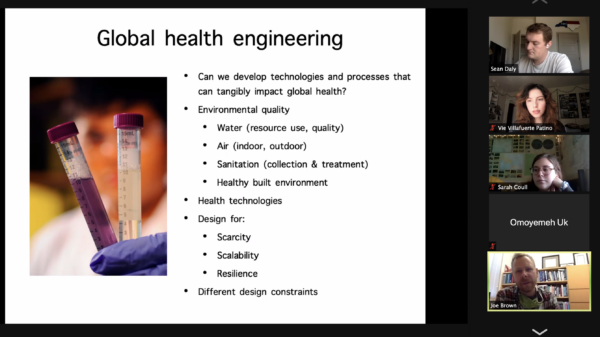On October 21st, we hosted Dr. Joe Brown, an environmental engineering professor at UNC-Chapel Hill. During the virtual event, Dr. Brown discussed the roles, responsibilities, and opportunities for engineers to work in global public health research, practice, and advocacy. He presented examples of what works – and what doesn’t – when technology and people collide, and offered thoughts on building a career in this area.
Dr. Brown gave an insightful presentation on the role of engineers in supporting global public health advancements. When working on sanitation and water supply problems in underserved communities, Dr. Brown reminded us that engineers need to think of questions such as: how to make sure that piped water supplies are really safe? How safe does water need to be to protect against endemic diseases? How will technologies work in challenging conditions? He reminded us that in order to answer these questions and come up with solutions, a well trained engineer not only needs technical skills and creativity, but also knowledge of society and cultural awareness.

Global WaSH members attending the webinar with Dr. Brown
He advised us that if we want to have a career in global water and sanitation we need solid technical skills, experience for many positions such as internships and research projects, soft skills like languages and cultural awareness helps to live abroad, and econ training is crucial in understanding international development. During the talk, there was a strong emphasis on having an understanding of the users when doing this kind of work as it is important to focus on the people and on their needs.
Dr. Brown also talked about his experience in Bolivia where he used local materials and manufacture to create a ceramic microfiltration system. “Technology plans an important role in overcoming constraints.” Some of the challenges for sanitation that he’s found during his experience are how to design sanitation option that people can and will pay for use and maintain over long periods, what to do with the waste, and what other options there are for challenging conditions.